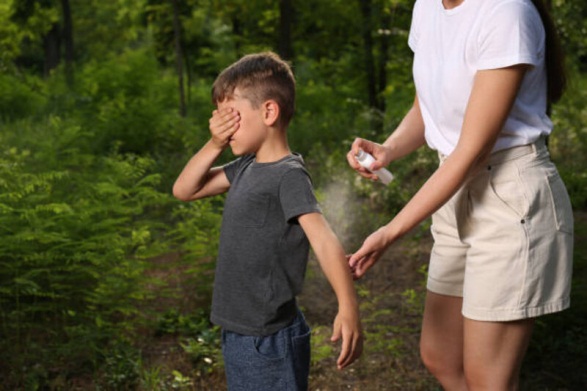Enduring the Sting: How to Relieve Mosquito Bites
Oct 18, 2023 By Madison Evans
Have you ever been outside enjoying the warmth of a sunny day when suddenly, out of nowhere, mosquitoes wreak havoc on your skin? The pesky bugs might seem small and innocuous, but their bites can really pack a punch! If you've experienced mosquito bites before, then you know how uncomfortable they can be. From intense itching to swollen bumps and redness around the bite site, it's no surprise that we all want quick relief from them. But what if there was a way to make these powerful stings less bothersome? In this blog post we'll give you some practical tips for managing those annoying mosquito bites so that instead of loathing them you can focus on enjoying being outdoors!
What happens when a mosquito bites?

Mosquitoes are attracted to our bodies for one reason: they need a blood meal! When these pesky critters come in contact with our skin, they release saliva and an enzyme that helps them draw blood from capillaries. This reaction causes our body to go into defense mode. We start producing histamines which cause inflammation and itching. In addition, the mosquito saliva can cause the affected area to swell and become red. All of this discomfort is what we call a mosquito bite!
Symptoms of Mosquito Bites:
- Intense itching
- Swelling
- Redness around the bite site
- Pain or discomfort in the area of the bite
Immediate Response to Mosquito Bites:
The best way to reduce the symptoms of a mosquito bite is to act quickly! There are several natural remedies that can help soothe the itching and swelling. Here are some of our top picks:
- Ice packs - Applying an ice pack or cold compress directly on the affected area for 5-10 minutes can significantly reduce redness, swelling, and itching.
- Aloe vera - Applying a thin layer of aloe vera gel can help soothe the itch and reduce inflammation.
- Apple cider vinegar - Dabbing a cotton ball soaked in apple cider vinegar on the affected area can also help relieve itching and discomfort.
- Baking soda paste - Mixing baking soda with a bit of water can make a paste that can be applied directly on the site of the bite. This will help draw out excess fluid and reduce swelling.
Home Remedies for Mosquito Bites:
In addition to the remedies stated above, there are other home remedies that can help ease the symptoms of mosquito bites. Some of these include:
- Calamine lotion - Applying calamine lotion directly on the affected area will help reduce itching and inflammation.
- Tea tree oil - This essential oil has strong anti-inflammatory properties which can be used to treat the bite and reduce swelling.
- Lemon juice - Applying a few drops of lemon juice on the affected area can also help relieve itching and pain.
- Honey - Covering the skin with honey for several minutes can help soothe redness and inflammation, as well as reduce any discomfort associated with the bite.
Taking these steps can help ease the pain and discomfort of mosquito bites. However, if symptoms persist or worsen, it is important to see a doctor for further treatment. Remember to always take precautionary measures when outside, such as wearing long-sleeved clothing and using insect repellents!
Over-the-counter Products:

Sometimes, the itch and discomfort can be too much to bear and over-the-counter medications may be necessary. Products such as antihistamines, hydrocortisone cream, and calamine lotion will help ease symptoms of mosquito bites. It is important to follow the instructions on the package for proper use. If symptoms persist or worsen after using these products for a few days, it is important to seek medical attention.
When to Seek Medical Help?
In some cases, the pain and itching from mosquito bites can be unbearable. If symptoms continue to worsen after trying home remedies and over-the-counter medications, it is important to seek medical help. A doctor may prescribe stronger medication or give other treatment advice to help relieve symptoms. In the event of any allergic reactions, such as difficulty breathing or swelling of the mouth and throat, seek medical help immediately.
Prevention of Mosquito Bites:
Although it may not always be possible to avoid mosquito bites completely, there are several measures you can take to reduce your chances of being bitten.
- Wearing long-sleeved clothing: Wearing long-sleeved clothing and pants can help reduce the number of mosquito bites you receive. If possible, wear light-colored clothes as dark colors tend to attract mosquitoes more.
- Using insect repellents: Using insect repellents with DEET is an effective way to prevent mosquito bites. Always follow the instructions on the package when using insect repellents.
- Avoid standing water: Mosquitoes lay their eggs in standing water, so it is important to avoid areas with stagnant water whenever possible. If you are not able to avoid these areas, try to minimize your exposure by wearing long-sleeved clothing and using insect repellents.
Conclusion
Mosquito bites can be very annoying and uncomfortable, but there are simple ways to reduce your chances of being bitten. By wearing long-sleeved clothing and using insect repellents with DEET, you can significantly reduce the number of bites you receive. In addition, avoiding areas with standing water can help prevent mosquitoes from laying eggs near you. Even if you do get bit, there are a variety of home remedies you can use to reduce the pain and itching associated with mosquito bites.
-
 Condition Oct 06, 2023
Condition Oct 06, 2023Battling the Unwanted: Understanding Intrusive Thoughts
Understand how to cope with uneasy and unwanted intrusive thoughts through mindfulness. Find help and guidance on how encouraging mental wellness.
-
Peace of mind Sep 05, 2024
Managing Psychosis: Effective Treatment Methods
Effective approaches to treat patients with psychosis. This article discusses essential ways to offer proper care and support for psychosis patients
-
 Condition Dec 14, 2023
Condition Dec 14, 2023When You Have Diverticulitis, Should You Avoid Certain Foods?
If you know anything about diverticulitis, you've probably been "recommended" to avoid the following. You are avoiding nuts, seeds, popcorn, and corn because they aggravate the condition. As it happens, that's bad guidance. Following the National Institute of Diabetes but instead Digestive Kidney Diseases, there is no proof that these foods increase the risk (NIDDK).
-
 Condition Feb 23, 2024
Condition Feb 23, 2024What Can Cause an Abnormal Pap Smear: All You Need To Know
If you get an abnormal test, it suggests your cervix has experienced cell alterations. Having this symptom may not always indicate cervical cancer
